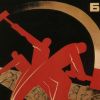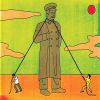-
 +15 +1
+15 +1Back to the U.S.S.R.: Russophobia is at its peak in Georgia
Quebec journalist Paule Robitaille undertakes a journey through the former Soviet Union, where she lived from 1990 to 1996. As we approach next month’s first anniversary of the Russian invasion of Ukraine, she examines how Moscow’s aggression is changing the lives of these people and the fragile equilibrium within these countries.
-
 +17 +1
+17 +1The Russian Venus Landers
Given the intense temperatures and pressures of Venus, it is indeed impressive that Russian engineers were able to successfully land vehicles there 10 times during the 1970s and 1980s. These were Venera 7 to 14, and Vega 1 and 2 which deployed landers and balloon-born instrument packages.
-
 +11 +1
+11 +1Soviet 'Enigma' cipher machine sells for $22k at collapsed museum's exhibits auction
James Bond? Inspector Gadget? Yup, all here
-
 +16 +1
+16 +1Red Army Blues
The Waterboys
-
 +3 +1
+3 +1The Black Disk of the Sun
Boris Dralyuk appreciates a “riveting political biography” of Mikhail Sholokhov, “Stalin’s Scribe” by Brian J. Boeck.
-
 +38 +1
+38 +1The Writer Who Destroyed an Empire
Aleksandr Solzhenitsyn, born 100 years ago today, did more than anyone to bring the Soviet Union to its knees.
-
 +29 +1
+29 +1The Bootleg Video Vans of the Soviet Union
I learned English—and Western culture—watching American movies in smoky minibuses.
-
 +9 +1
+9 +1The Sharashka Phenomenon
As many older Russians undoubtedly remember, by the early 1970s, the culture of underground or samizdat literature in the Soviet Union had evolved into a highly risky but established system for disseminating information among the dissident community… By Asif Siddiqi. (Mar. 10, 2011)
-
 +18 +1
+18 +1The war game that could have ended the world
A military exercise staged 35 years ago this week almost triggered World War Three. Previously secret documents now reveal what happened. By Richard Hollingham.
-
 +25 +1
+25 +1The Soviet Children's Books That Broke the Rules of Propaganda
How folk tales and traditional life snuck into avant-garde kids' books in the 1930s.
-
 +31 +1
+31 +1Postcards From Big Brother: The Curious Propaganda of a Brutal Soviet Era
Compared with the sophisticated technology Russia employed to meddle in the 2016 U.S. election, the Soviet propaganda in Brutal Bloc Postcards, published by FUEL Design and Publishing, seems downright quaint. Many of these postcards, published by governments of the U.S.S.R. between the 1960s and 1980s, depict the bland, 1960s five-story concrete-paneled apartments known as “khrushchyovka” as if to say, “Look at the modern wonder of collective worker housing!”
-
 +11 +1
+11 +1The Remains Of Stalin’s Dead Road
In Russia’s arctic wilderness, the remnants of one of the Soviet Union’s most tragic gulag projects now lies largely forgotten.
-
 +34 +1
+34 +1For 11 Years, the Soviet Union Had No Weekends
The experiment of a 'continuous week' was shift work, on a colossal scale. And it failed.
-
 +16 +1
+16 +1CIA declassifies cache of Soviet jokes compiled during the Cold War
A cache of Soviet jokes that was compiled by CIA agents during the Cold War has been released among a cache of declassified documents. All the jokes were told between Soviets but picked up by CIA operatives before being relayed back to Washington. The list was addressed to the Deputy Director of the CIA but it is believed to have been circulated among senior White House officials.
-
 +2 +1
+2 +1Czechs still shiver from Soviet 1968 invasion
Czechs worry that too many have forgotten the 1968 Soviet-led invasion of Czechoslovakia.
-
 +9 +1
+9 +1“Every Day I Wake Up in a Strange Land”: Remembering the Russian Poet Naum Korzhavin
Some of the most searing poems by Korzhavin, who has died, at the age of ninety-two, focus on his decision to go into exile, to America, in the seventies. By Masha Gessen.
-
 +6 +1
+6 +1Mourning Joe
In many ways, Stalin is key to understanding Georgia’s political climate. By Jessica Loudis.
-
 +11 +1
+11 +1Forty-Five Things I Learned in the Gulag
Varlam Shalamov claimed not to have learned anything from the Gulag except how to wheel a loaded barrow. But one of his fragmentary writings, dated 1961, tells us more.
-
 +18 +1
+18 +1Russian museum discovers secret order to destroy Gulag data
A museum studying Soviet prison camps has discovered a secret Russian order from 2014 instructing officials to destroy data on prisoners – a move it said “could have catastrophic consequences for studying the history of the camps”. Up to 17 million people were sent to the Gulag, the notorious Soviet prison camp system, in the 1930s and 1940s. At least 5 million of them were convicted on false testimony. The prison population in the labour camps peaked at 2 million people.
-
 +12 +1
+12 +1My Mother’s Brilliant Career in Soviet Culture
In the morning, she wrapped the four limp fish in damp sheets of Soviet Culture and stuffed them into an oilskin hamper. It leaked, but the trolleybus taking us to the airport for her flight to Leningrad was empty at that early hour, so no one noticed. She carried the hamper in one hand and her suitcase in the other, while I bore her portable typewriter. The fish delivered, the defense of her thesis was a breeze. Mother passed with flying colors.
Submit a link
Start a discussion




















